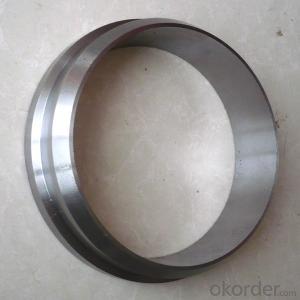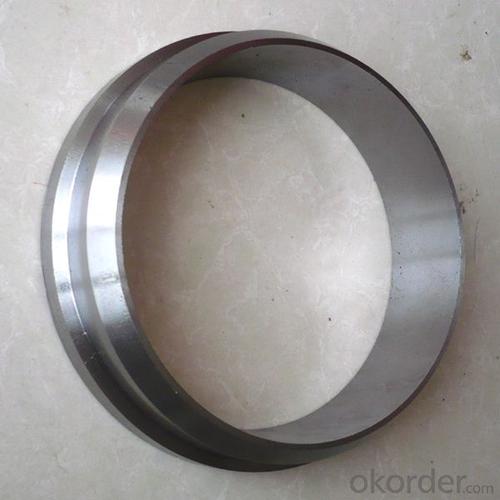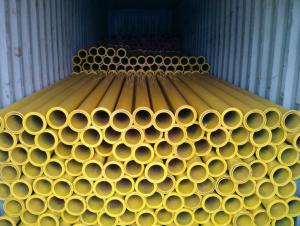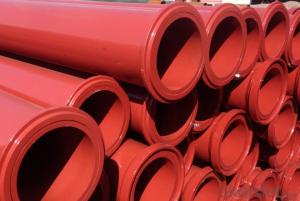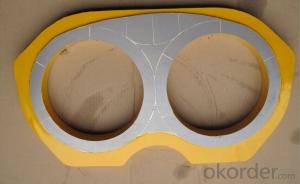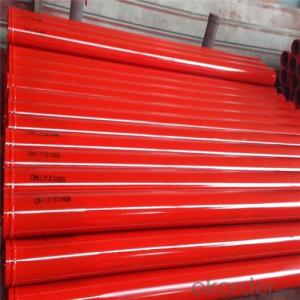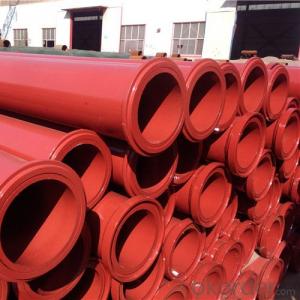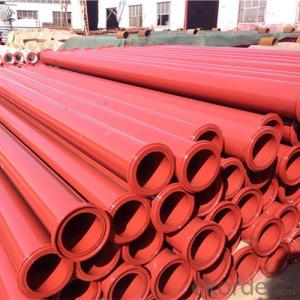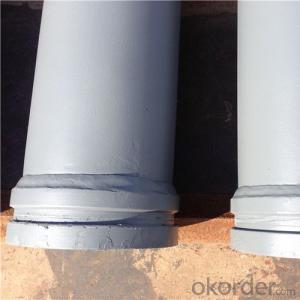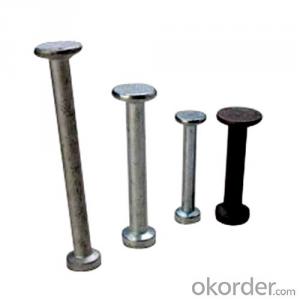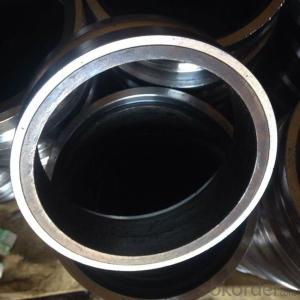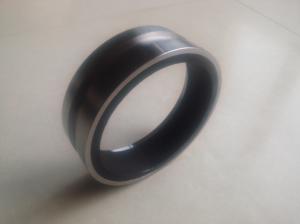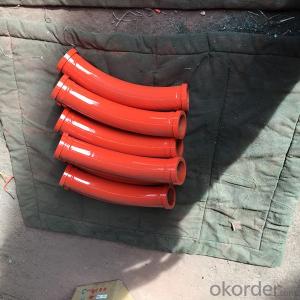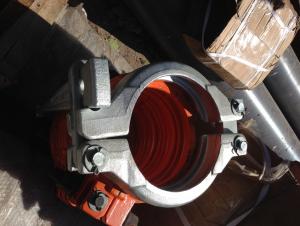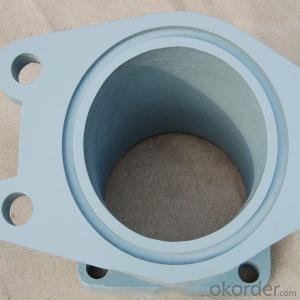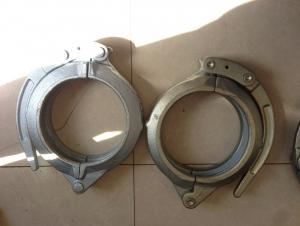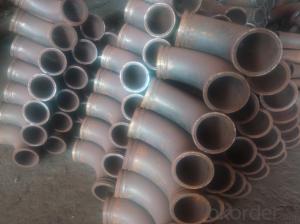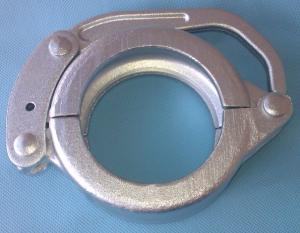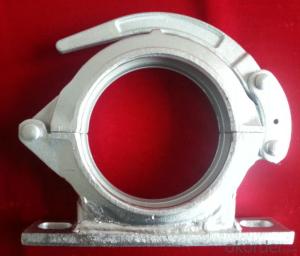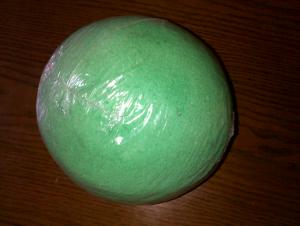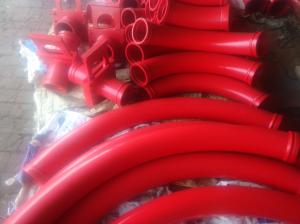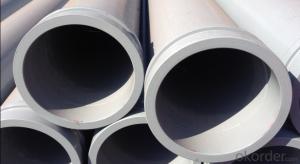Concrete Pumps Spare Parts Welding Flange DN125MM X 29MM
- Loading Port:
- Tianjin
- Payment Terms:
- TT OR LC
- Min Order Qty:
- 100 pc
- Supply Capability:
- 100000 pc/month
OKorder Service Pledge
OKorder Financial Service
You Might Also Like
Product Description:
The Concrete Pumps Spare PartsWelding Flange DN125MM X 29MM normally made by special MN13-4, to make sure the quanlity of elbows according to customer’s requests we usually keep the content of MN strictly over 15%, it will have a longer life as well, package will be in plywood box or cartons and put into container.
Scope of Application of the Goods
The Concrete Pumps Spare Parts Welding Flange DN125MM X 29MM is a concrete pumps parts for combined use with other concrete parts in for concrete pumps and truck pumps. It can be widely used in the construction of various types of concrete structures like industrial and civil buildings, bridges, roads, and other types of infrastructure.
This seals can only be used in Schwing type concrete pumps and truck pumps as well, but not in any other operations.
Product Advantages:
OKorder's Concrete Pumps Spare Parts Elbow Welding Flange DN125MM X 29MM Channels are durable, strong, and safety.
Main Product Features:
· Premium quality
· Prompt delivery & seaworthy packing (5-10 days)
Reliable performance
Easy to weld
High safety.
· Professional Service
· Competitive pricing
Measuring of wall thickness from the outside
Low purchase cost
Specifications:
DN:125MM
Width:29MM
Material: ST52
FAQ:
Q1: How long about delivery time Concrete Pumps Spare Parts Welding Flange DN125MM X 29MM ?
A1: Normally we keep the raw materials for old customers and sometime we also keep stock products to make sure delivery time in any emergency cases.
Q2: How do we guarantee the quality of our Concrete Pumps Spare Parts Welding Flange DN125MM X 29MM ?
A2: We have established an advanced quality management system which conducts strict quality tests at every step, from raw materials to the final product. At the same time, we provide extensive follow-up service assurances as required.
Q3: How soon can we receive the product after purchase?
A3: Within three days of placing an order, we will book the vessel for goods. The specific shipping date is dependent upon international and government factors, but is typically 7 to 30 workdays.
Q4: If we can produce some goods according to customers request?
A4: Yes, we can produce Welding Flange DN125MM X 29MM according to the difference country situations to make it suitable to the market and customers. We have very professional technical team to make the design for porduction of seals.
Q5: How to make a quick resolution for after service?
A5: OKorder and our manufacture both have overseas branches all-around of world.
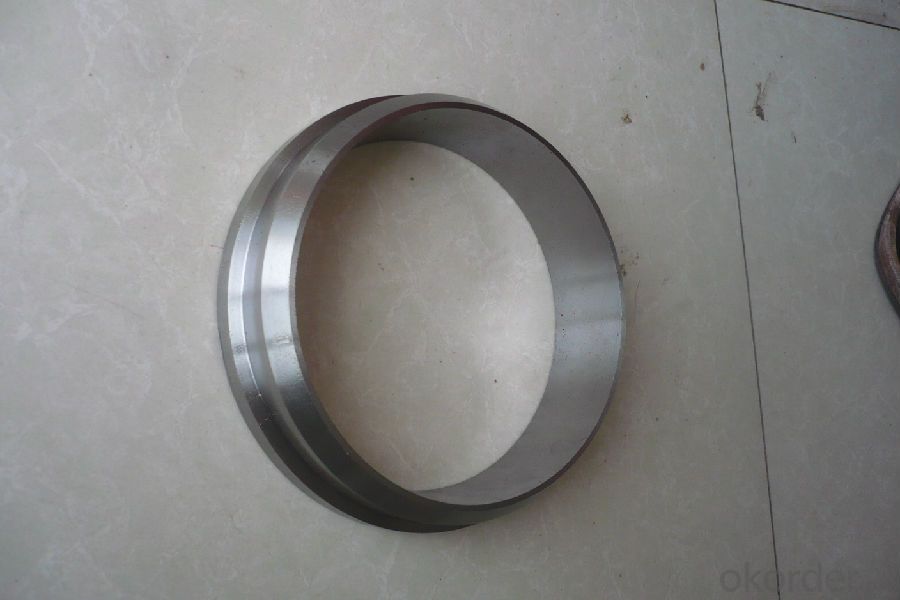
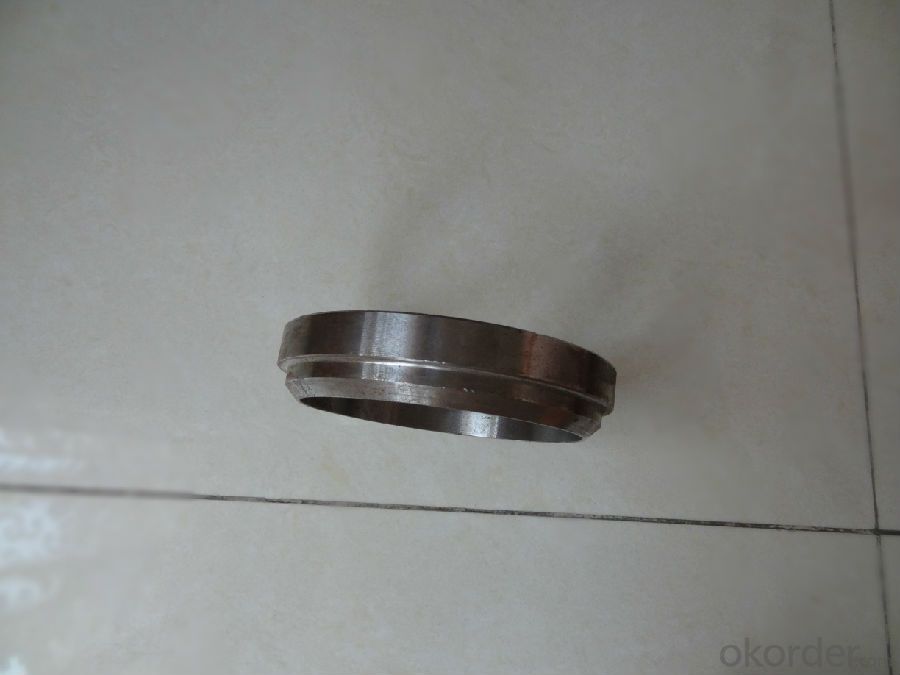
- Q: Can concrete pump spare parts be pre-assembled or pre-tested before installation?
- Concrete pump spare parts can undergo pre-assembly and pre-testing prior to installation. This allows for quality control measures to be implemented before the actual installation takes place, ensuring that any defects or issues with the parts can be identified and resolved before they are put into the concrete pump. Furthermore, pre-testing the spare parts guarantees their functionality and compatibility with the pump system, enabling any necessary adjustments or modifications to be made in advance. By engaging in these practices, the risk of complications during the installation process is reduced, resulting in a smooth and efficient operation of the pump system.
- Q: How can one ensure proper functioning of concrete pump spare parts after installation?
- To ensure proper functioning of concrete pump spare parts after installation, it is important to follow a few key steps. Firstly, it is crucial to carefully inspect and clean the parts before installation to ensure they are free from any debris or damage. Additionally, it is essential to use high-quality parts from reputable manufacturers to ensure durability and reliability. Regular maintenance and lubrication of the spare parts is also necessary to prevent wear and tear. Lastly, it is important to operate the concrete pump within its specified limits and avoid overloading, as this can cause stress on the spare parts and lead to malfunctioning.
- Q: What are the different types of concrete pump hopper cylinders seals?
- There are several different types of concrete pump hopper cylinder seals, each designed to meet specific needs and requirements. Some of the most common types include: 1. Piston seals: These seals are designed to prevent leakage between the piston and cylinder bore. They are typically made of durable materials such as rubber or polyurethane, and are resistant to abrasion and wear. 2. Rod seals: Rod seals are installed on the piston rod to prevent leakage between the rod and cylinder head. They are often made of materials such as rubber or fabric-reinforced rubber, and provide reliable sealing even under high pressure conditions. 3. Wiper seals: Wiper seals are used to remove dirt, dust, and other contaminants from the piston rod as it retracts into the cylinder. They are typically made of polyurethane or rubber, and are designed to provide effective sealing and protection for the cylinder. 4. Wear rings: Wear rings are used to reduce friction and prevent metal-to-metal contact between the piston and cylinder bore. They are typically made of materials such as bronze or Teflon, and help to extend the lifespan of the cylinder by reducing wear and tear. 5. Backup rings: Backup rings are used in conjunction with other seals to provide additional support and stability. They are typically made of materials such as rubber or PTFE, and help to prevent extrusion and damage to the primary seal. Overall, the selection of the appropriate concrete pump hopper cylinder seal depends on factors such as the specific application, operating conditions, and desired performance characteristics. It is important to choose seals that are compatible with the pumped material, provide effective sealing, and have a long lifespan in order to ensure optimal performance and minimize maintenance requirements.
- Q: What are the common signs of wear and tear on concrete pump spare parts?
- The specific signs of wear and tear on concrete pump spare parts can vary depending on the part in question. However, there are general indications that suggest when a concrete pump spare part is experiencing wear and tear. One indication is the presence of visible damage or deterioration on the surface of the part. This may manifest as cracks, chips, or dents on the outer layer of the spare part. These damages can occur due to regular usage, exposure to harsh environmental conditions, or accidental impact during operation. Another sign is an increase in vibration or noise during operation. If a concrete pump spare part is undergoing wear and tear, it may generate unusual vibrations or noises that were not evident when it was in good condition. This can signify internal damage or misalignment of the part, which can impact its overall performance and efficiency. Diminished performance or efficiency is also a common signal of wear and tear on concrete pump spare parts. If a part is experiencing wear and tear, it may not operate as efficiently as before, resulting in reduced pumping capacity, decreased flow rate, or inefficient operation. This can cause delays in construction projects and increased maintenance costs. Furthermore, an escalation in maintenance and repair requirements can indicate wear and tear on concrete pump spare parts. If a part needs more frequent repairs or replacements than usual, it may suggest that it is undergoing wear and tear. Regular inspections and maintenance can aid in early identification of potential issues and prevent further damage to the spare parts. In conclusion, signs of wear and tear on concrete pump spare parts can include visible damage, heightened vibration or noise during operation, diminished performance or efficiency, and increased maintenance demands. It is crucial to regularly inspect and maintain these spare parts to ensure optimal performance and prolong their lifespan.
- Q: How to diagnose the blockage in the inlet of concrete pump?
- If it doesn't work, you'll have to clean it up manually and rule it out.
- Q: How often should concrete pump booms be inspected and maintained?
- Concrete pump booms should be inspected and maintained regularly, ideally on a monthly basis or as recommended by the manufacturer. This regular inspection and maintenance schedule helps ensure the safe and efficient operation of the equipment and minimize potential risks or breakdowns.
- Q: How do I ensure the compatibility of mechanical components in concrete pump spare parts?
- To ensure the compatibility of mechanical components in concrete pump spare parts, there are several key steps you can follow: 1. Identify the specific make and model of your concrete pump: Different concrete pumps may have varying designs and specifications, so it is crucial to know the exact make and model of your pump. This information will help you determine the compatible spare parts for your specific pump. 2. Consult the manufacturer's documentation: Review the manufacturer's documentation, including the user manual and parts catalog, to understand the recommended spare parts for your concrete pump. These documents often provide detailed information on the compatibility of various mechanical components. 3. Seek advice from the manufacturer or authorized dealers: If you are unsure about the compatibility of certain mechanical components, it is best to reach out to the manufacturer or authorized dealers. They have extensive knowledge and experience with their products and can provide guidance on selecting compatible spare parts. 4. Consider OEM (Original Equipment Manufacturer) parts: OEM parts are specifically designed and manufactured by the original equipment manufacturer. Using OEM parts ensures the highest level of compatibility and reliability. While they may be slightly more expensive than aftermarket alternatives, they often provide better performance and longer service life. 5. Check for standardized sizing and specifications: Mechanical components, such as seals, gaskets, and bearings, often have standardized sizes and specifications. Verify that the spare parts you are considering match these standardized measurements to ensure compatibility. 6. Conduct thorough research and comparison: Before purchasing spare parts, research different suppliers and compare their offerings. Look for reputable suppliers who specialize in concrete pump spare parts and have a track record of delivering high-quality, compatible components. 7. Perform compatibility tests: If you are uncertain about the compatibility of a particular mechanical component, consider conducting compatibility tests. This can involve installing the spare part in your concrete pump and verifying its fit, function, and performance. If possible, consult with a qualified mechanic or technician to assist you in conducting these tests. By following these steps, you can ensure the compatibility of mechanical components in concrete pump spare parts, minimizing the risk of compatibility issues and ensuring the smooth operation and maintenance of your concrete pump.
- Q: What is the first generation pumping technology of concrete pump?
- Electronically controlled reversing technology, PLC control solenoid valve reversing to achieve the pump, S pipe distribution of alternating direction
- Q: What are the advantages of using tungsten carbide components in concrete pump spare parts?
- There are several advantages of using tungsten carbide components in concrete pump spare parts. Firstly, tungsten carbide is an extremely hard and durable material, which ensures longer lifespan and increased wear resistance of the components. This means reduced maintenance and replacement costs in the long run. Additionally, tungsten carbide has excellent corrosion resistance, making it suitable for use in harsh and corrosive environments commonly found in concrete pumping applications. Furthermore, tungsten carbide components offer superior strength and toughness, enabling them to withstand high-pressure and heavy-duty operations without compromising performance. Overall, the use of tungsten carbide in concrete pump spare parts leads to improved efficiency, reliability, and cost-effectiveness in concrete pumping operations.
- Q: What are the key considerations when purchasing spare parts for a concrete pump?
- When purchasing spare parts for a concrete pump, the key considerations include ensuring compatibility with the specific make and model of the pump, quality and durability of the parts, availability and delivery time, cost-effectiveness, and the reputation and reliability of the supplier.
Send your message to us
Concrete Pumps Spare Parts Welding Flange DN125MM X 29MM
- Loading Port:
- Tianjin
- Payment Terms:
- TT OR LC
- Min Order Qty:
- 100 pc
- Supply Capability:
- 100000 pc/month
OKorder Service Pledge
OKorder Financial Service
Similar products
Hot products
Hot Searches
Related keywords
